[Updated 4-30-23]
Comparing data from the survey: update on Portuguese version of the survey
Some numbers
Live now and being spread by our Brazilian colleagues for just over a week, the Portuguese version of our survey has 129 responses. Combined with the English language version (n=950) that makes a total of 10791 respondents to date. Although we expect many more respondents before we close the surveys on June 1st, the preliminary results are quite interesting.
What I’ll present below are just a few glimpses of the quantitative data thus far, comparing results from both versions of the survey. At this point we can begin to present the ‘what’ but can only offer conjecture as to the ‘why’ behind these numbers. Please allow me to share some beginning thoughts about these data, starting with the demographic makeup of the respondents, and then onto even more interesting numbers including the ‘cult’ question, psychological abuse, and, critically, sexual abuse.
Who is taking the survey and what do they look like?
In this first table (Question 1) we see a significant difference in responses between how the Portuguese and English speaking populations describe their current relationship to Seventh-Day Adventism.
English speakers selected “I consider myself a Seventh-day Adventist” only 3% of the time while in the Portuguese version that number is 13%.
By as considerable margin -77% compared to 52%- English speakers were more likely to choose “Ex-Adventist: I have left the Seventh-Day Adventist Church. I no longer pay tithe, no longer participate in governance or management. I do not follow Adventist rules in my personal life”
While only 7% of the English speakers chose “Believing Ex-Adventist: I still follow the doctrines and teachings of the original founders, but I have left or in some way been separated from the formal structure and community” nearly four times as many -27%- Portuguese speaks chose this option.
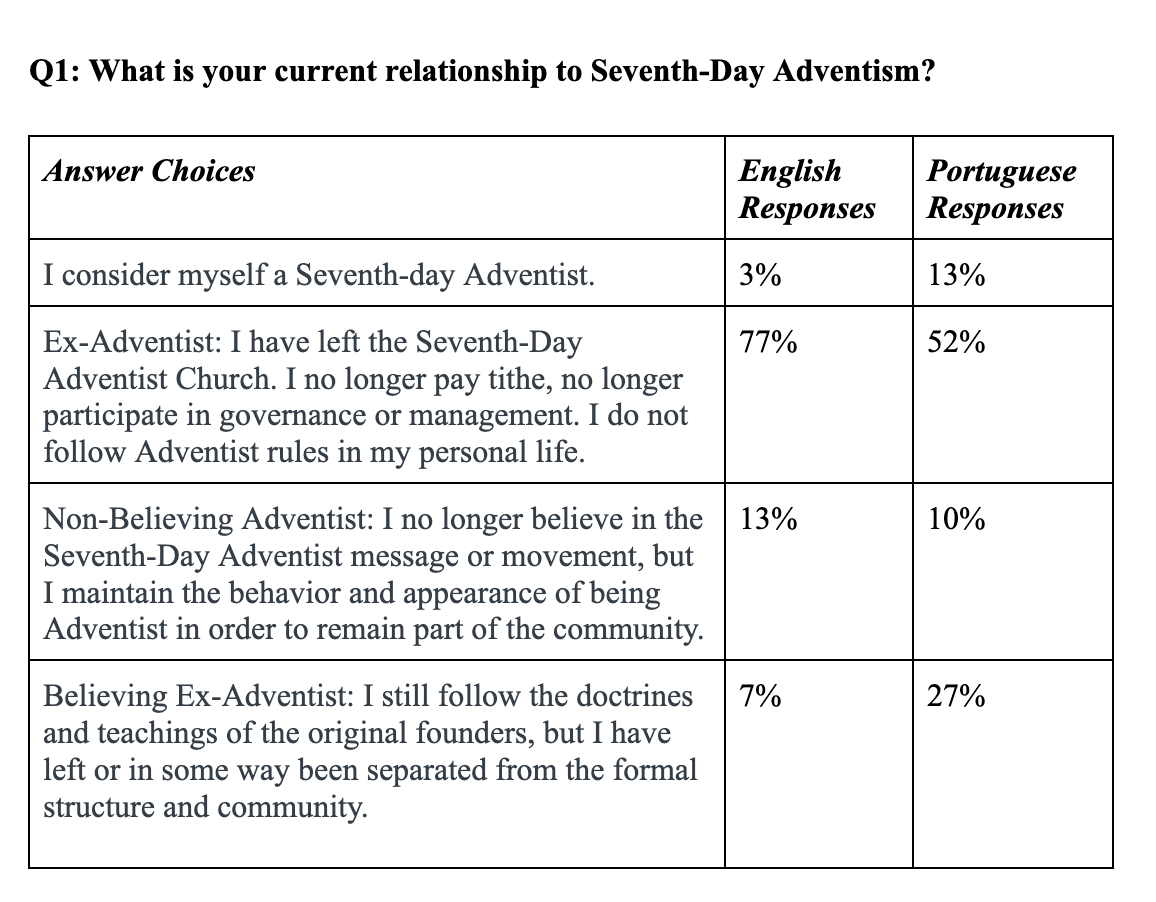
Different demographic characteristics?
From the data below we begin to see that the Portuguese speaking respondents are more likely to be female (68% compared to 55%), somewhat better educated (21% PhD/Post-graduate diploma compared to 16%), significantly younger with a large majority being Millennials (72%!) as compared to only 37% in that same category for the English speaking respondents. Not surprisingly, the Portuguese version being circulated mostly in Brazil has a much higher percentage (39% compared to 24%) indicating ‘non-white’. [Please refer back to an earlier post discussing this variable.]
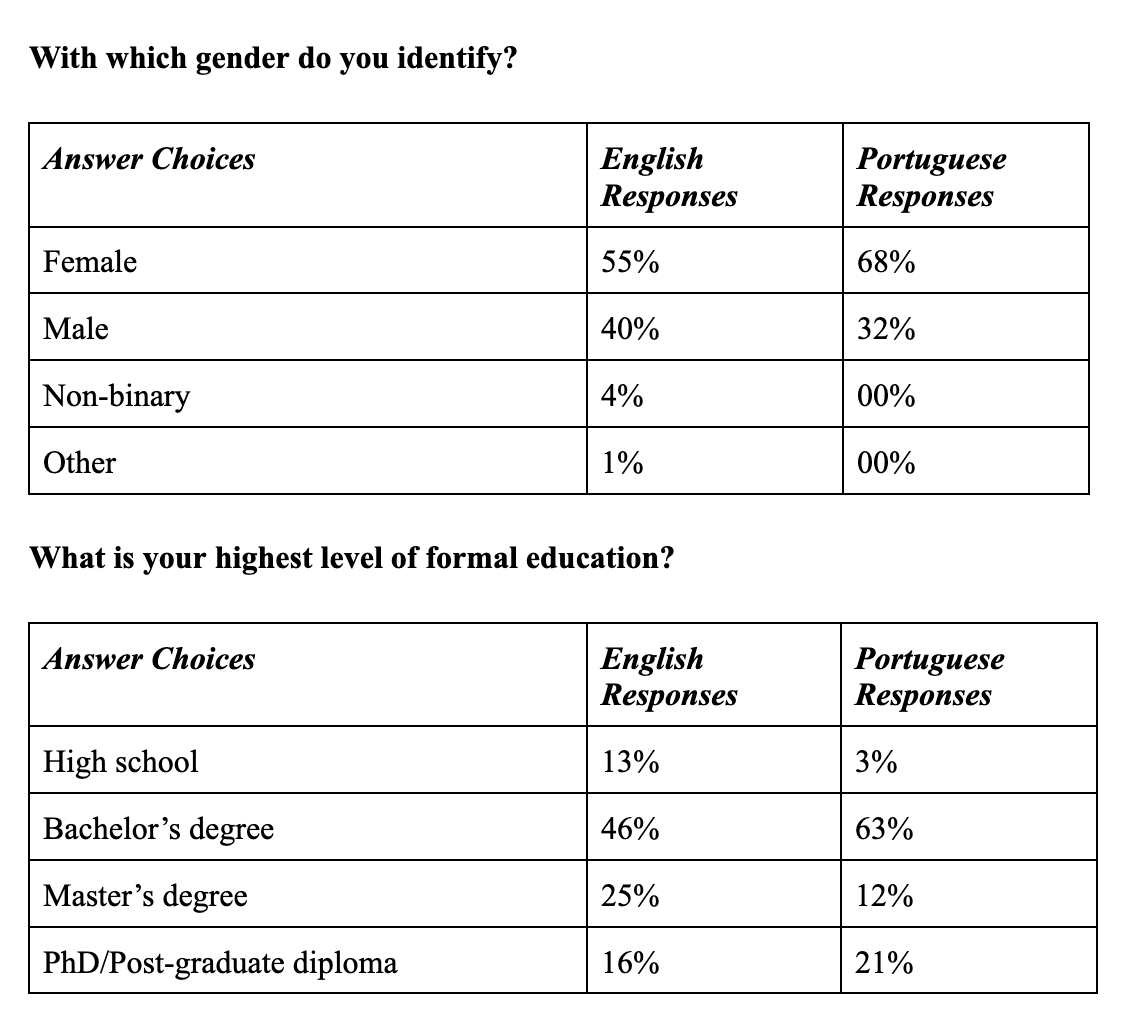
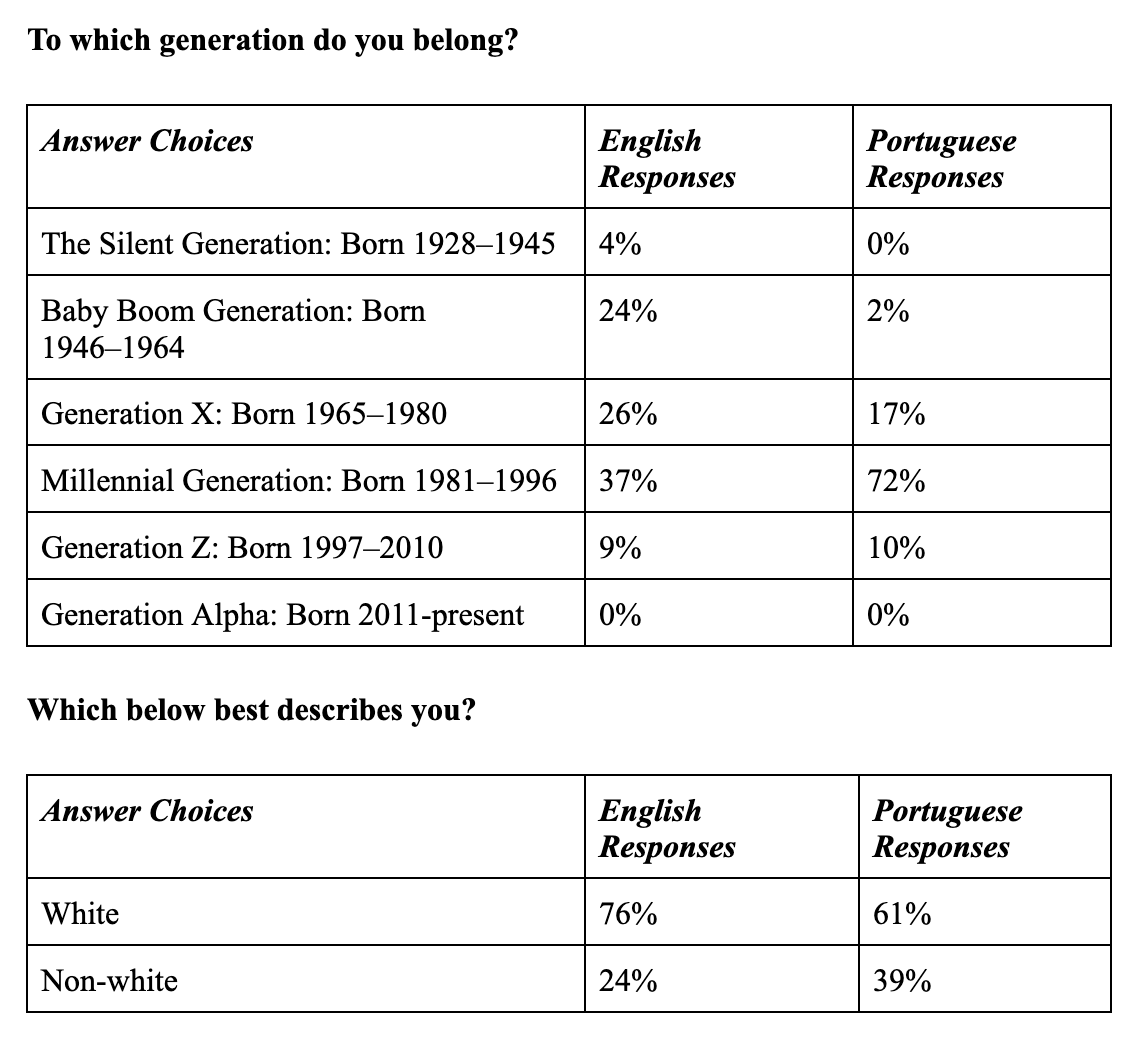 Fewer atheists in Brazil?
Fewer atheists in Brazil?
In Q13 we offered a forced choice question helping us to see how our respondents described themselves. More than twice as many Portuguese speakers (81% compared to 40%) chose “Christian, but not Adventist”. While the English version respondents were open to checking either the Agnostic or Atheist choices (56% total), the Portuguese speakers were far less likely at 15% to choose either of these descriptors.
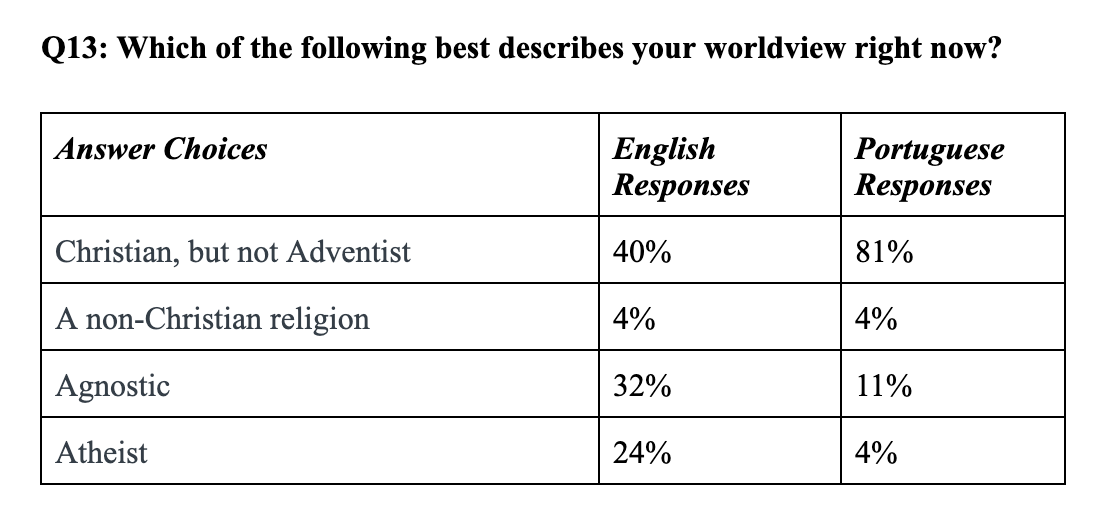
Less angry toward Adventism in Brazil?
The numbers below seem to indicate some differences related to holding anger or resentment toward the Seventh-day Adventist Church. As we get deeper into our analyses perhaps we will be able to get a clearer sense of why these differences appear to exist and how they are correlated to other variables such as time spent in Adventist schools and universities, gender identification, race, and levels of both psychological and sexual abuse experienced.
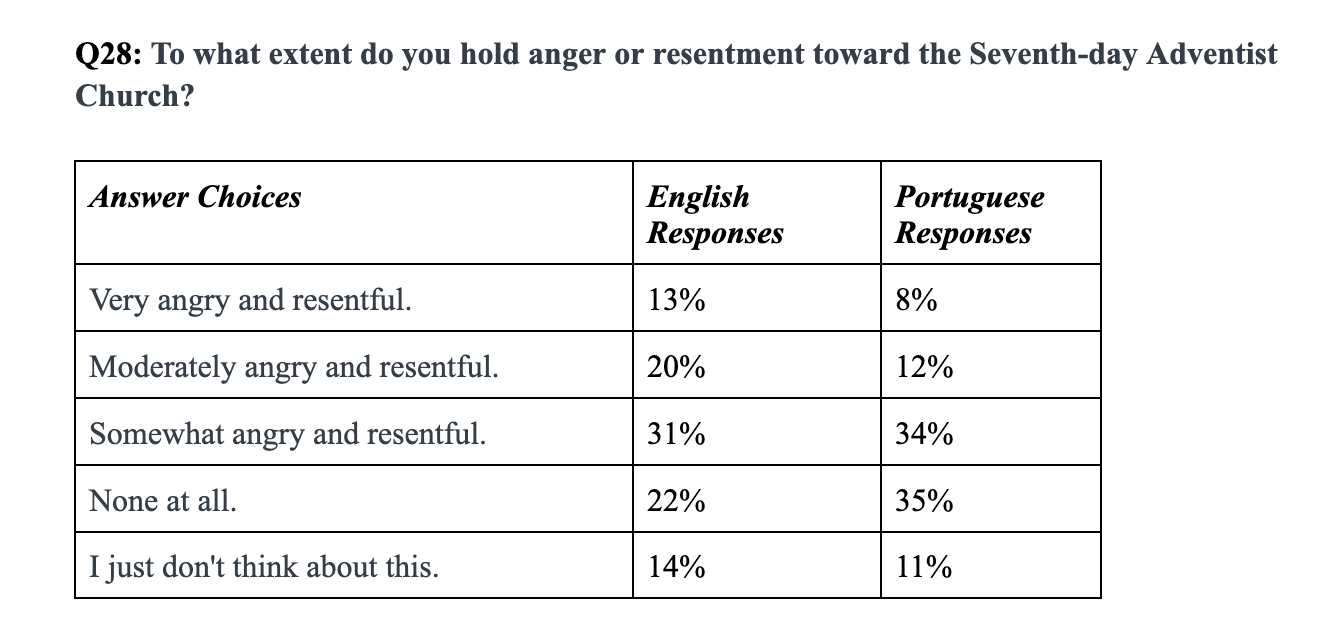
How does being an Adventist -or an ex-Adventist- impact various perspectives?
Question 34, “Have your political views changed since leaving Adventism?” is one that I personally will be keen to watch as we approach the next election cycle here in the United States. We are seeing a clear macro-level trend toward secularization across the globe and including most religions -Adventism being no exception. For more details and description of this trend read Dr. McClearn’s ‘s blog post on the decline in religion from a couple weeks ago.
Declining numbers of believers coupled with the trend that those leaving religion get more liberal makes these numbers a potential game changer in politics both globally and here in the US. And given that politic views are highly correlated with other social perspectives, these data are particularly important for me as an academic who has been studying and teaching about social justice issues my entire career.
So, at least at a first glance the numbers from Q34 are quite clear: most people who leave Adventism change their political views, becoming more liberal, though slightly less so in Brazil among Portuguese speakers.
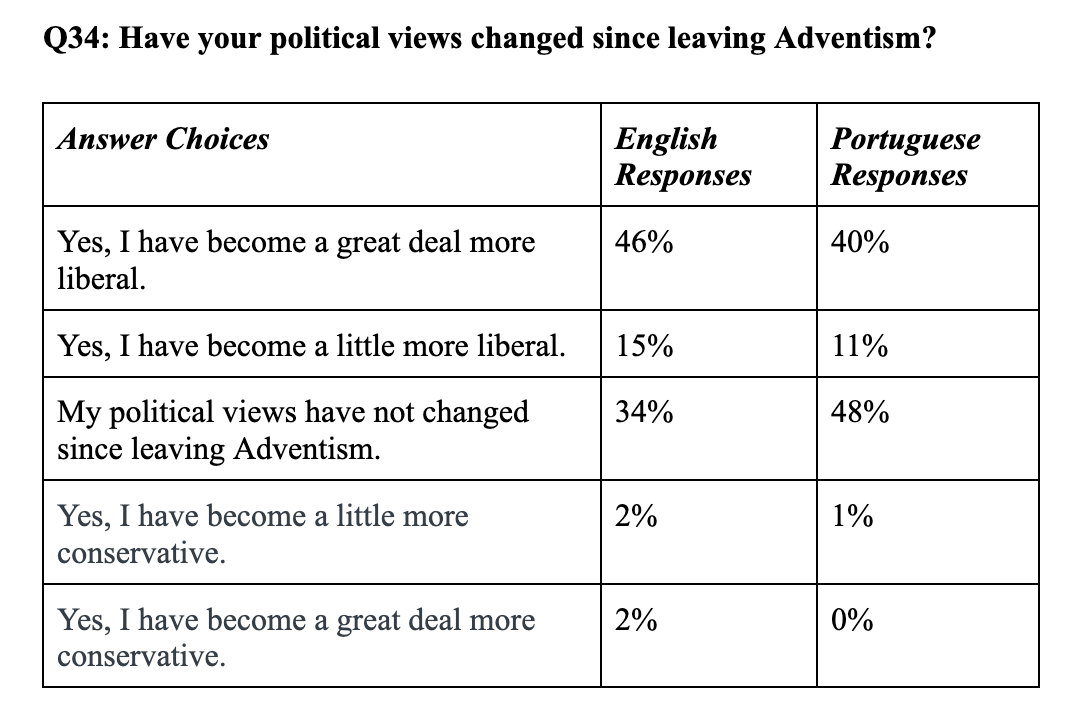
Other views related to end-times teachings
As someone who studied and teaches about global social problems, I find the data below concerning. As you can see below, on Q35 most respondents in both the English (76%) and the Portuguese (61%) checked “End-times teachings perpetuate an indifference regarding the climate crisis and other environmental concerns.” Then on Q36 “How do you think Adventist teachings about end-times impact most believers’ opinions related to social justice issues like racism and women’s rights?” the same trend continues with the the English (64%) and the Portuguese (73%) respondents indicating “End-times teachings perpetuate an indifference related to social justice issues like racism and women’s rights.”
According to the Pew Research Center nearly 4 in 10 Americans believe “we are living in the end times.” Our research indicates that those believing in end-times are dramatically indifferent about major issues facing humanity.
Not unrelated, our data show a sizable majority of the respondents using both versions believed their critical thinking skills e.g., awareness of scientific knowledge, were diminished while a member of the SDA. Combining “A great deal” and “A lot” the numbers are nearly identical for the the English (61%) and the Portuguese (60%). Astoundingly, only 14% on the English version and 9% on the Portuguese version indicated “Not at all.”
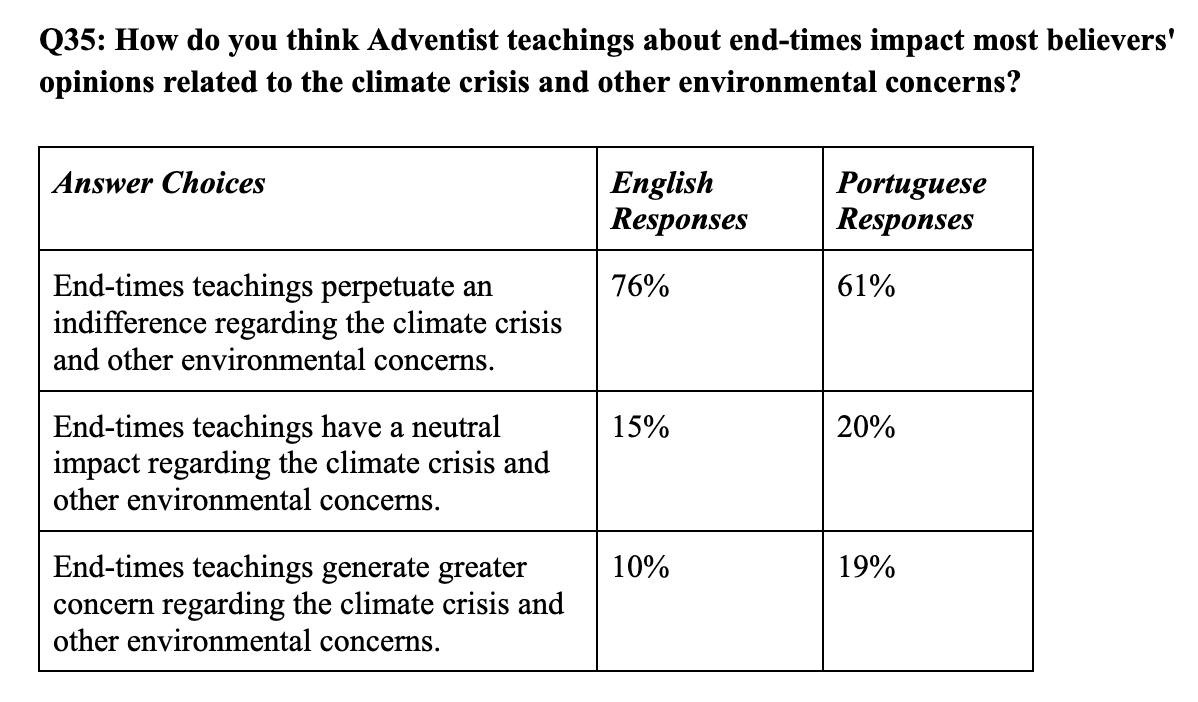
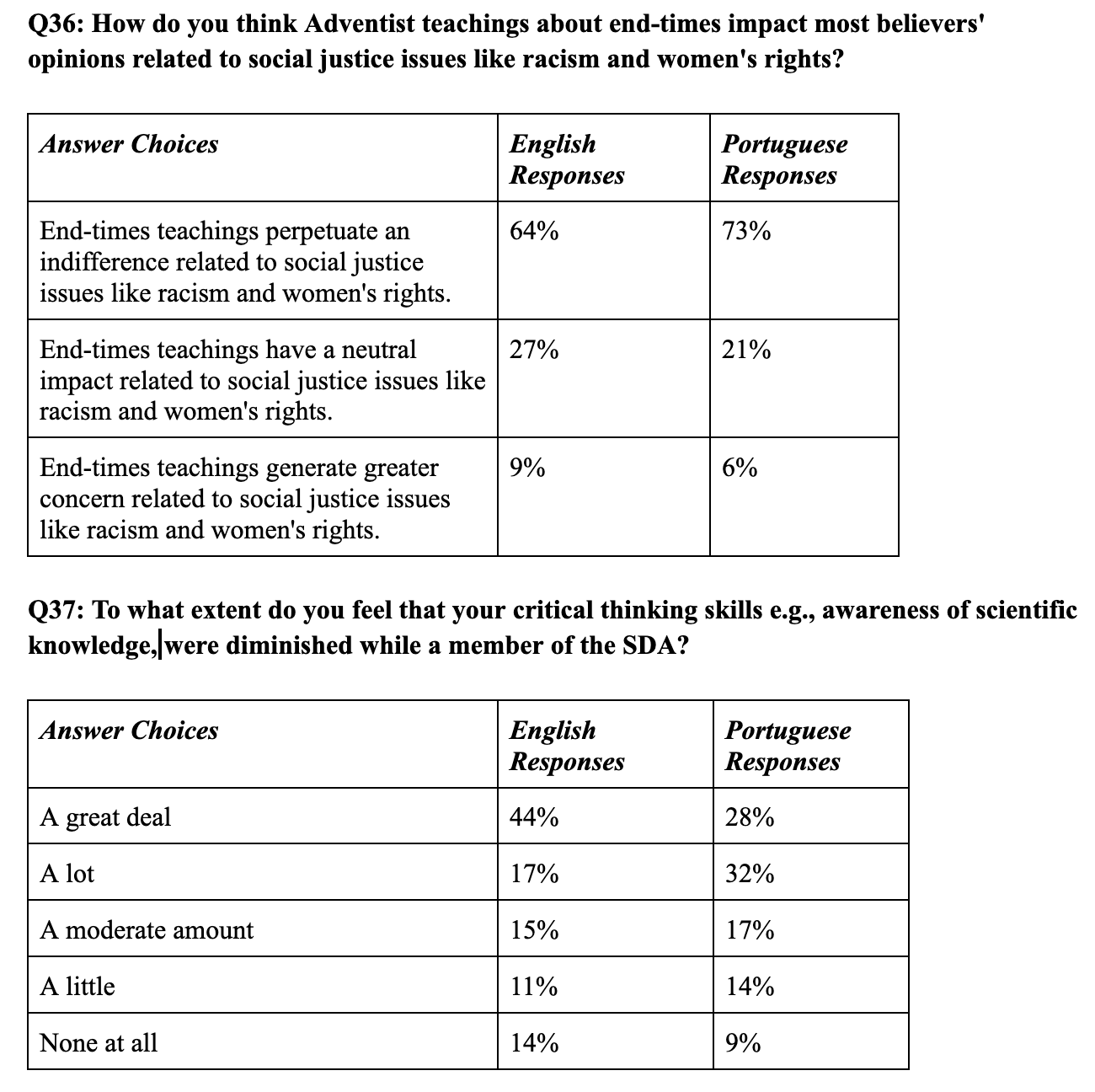
Mental health after leaving Adventism
One main goal of this survey was to explore impact of the journey departing the Adventist Church, hence the title for this blog, Eight-Day Freedom. One of our hypotheses going into collecting the data was this ‘freedom’ would be beneficial. Question 38 asks,“With regard to your overall mental health and quality of life, which below best describes how you feel?” and the responses from both versions are similar. Combining the first two responses, “My overall mental health is much better now that I am no longer an Adventist” and “My overall mental health is a little better now that I am no longer an Adventist” we see an overwhelming majority of the respondents -English (81%) and the Portuguese (74%)- feel their mental health is better after leaving Adventism. Here is what one respondent wrote in the comment box2 we provided for this question:
“As an SDA, I experienced significant levels of peace, love, and compassion for others. As an unbeliever the levels of all three have increased. I am now happier, more kind to others, and experience a deeper sense of peace and love.”
Another added,
“I feel that I can be much more honest about my beliefs now. Much less cognitive dissonance.”
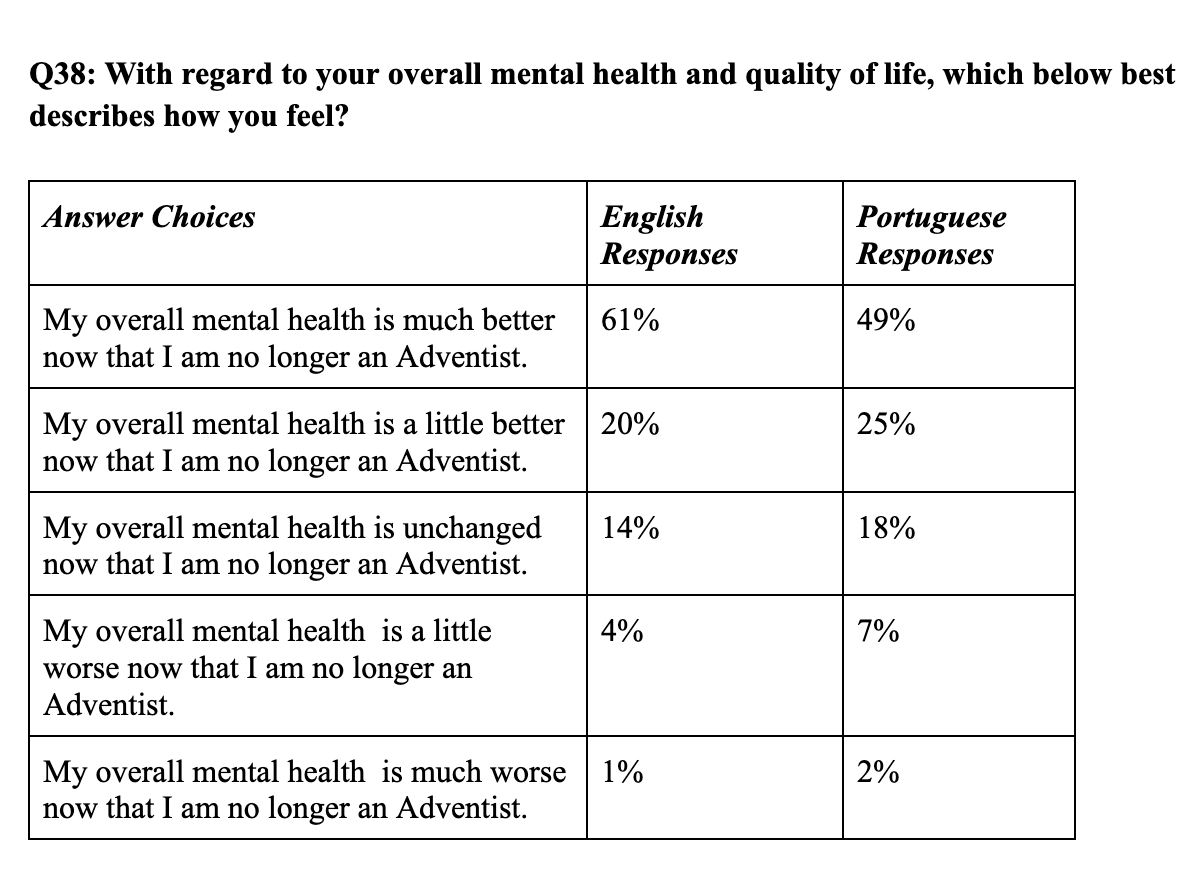
The ‘cult’ question, again
In an earlier blog post I presented data indicating most survey respondents viewed Adventism as a cult. The contrast between respondents on the two versions here is stark. Where 61% using the English version strongly agreed or agreed only 28% of the Portuguese respondents felt the same. Why there is such a difference may have to do with how the word ‘cult’ is translated and nuances of meaning and connotation associated with the concept.
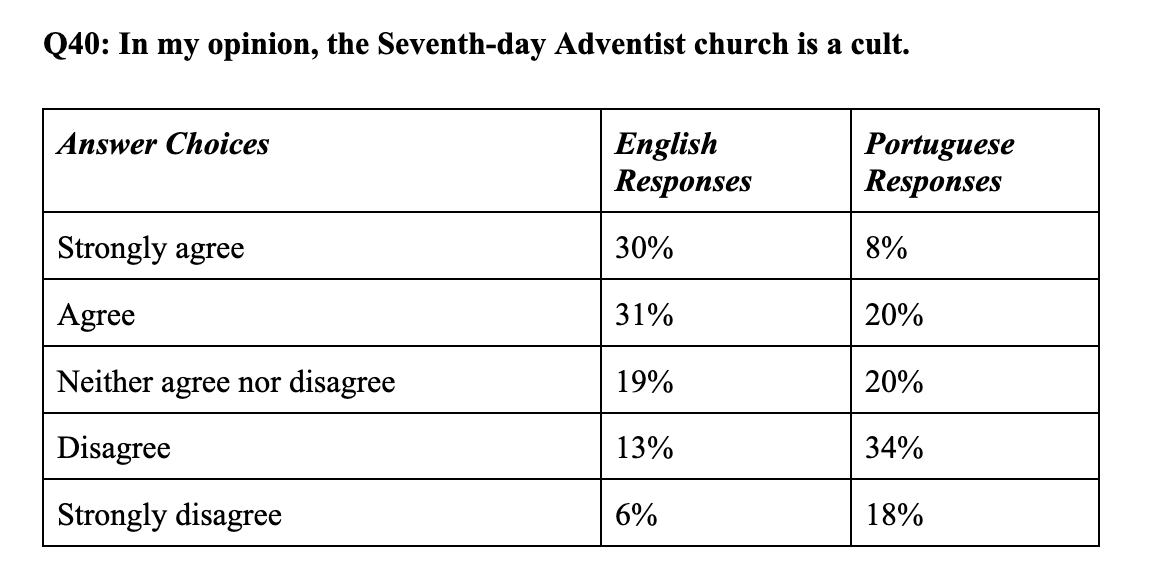
More to come soon
I will be updating this post in the next 24 hours with some data on the questions related to psychological and sexual abuse within the Church.
In the meantime, please contact me at arcaro@elon.edu with comments or feedback.
1Dr. Brandner, the quantitative expert on our research team, assures us the numbers of responses we have even just to this point are large enough for fairly robust statistical analysis.
2Many of our questions provided space for respondents to elaborate on their answer. These qualitative data will be presented in more detail in future blog posts and in our final analyses.


 Follow
Follow
I would like to know how you have found your ex-Adventists–what sources, please. I am a sociologist who writes about Adventists, but my focus is on personal interviews, and I have not focused much on Ex-Adventists, but find your questions interesting, even fascinating. But I found myself asking how you gathered your respondents–I have not seen a discussion of that on your site.
We used a convenience cum ‘snowball’ sample, mentioning the survey and url in various social media sites (e.g. Reddit).